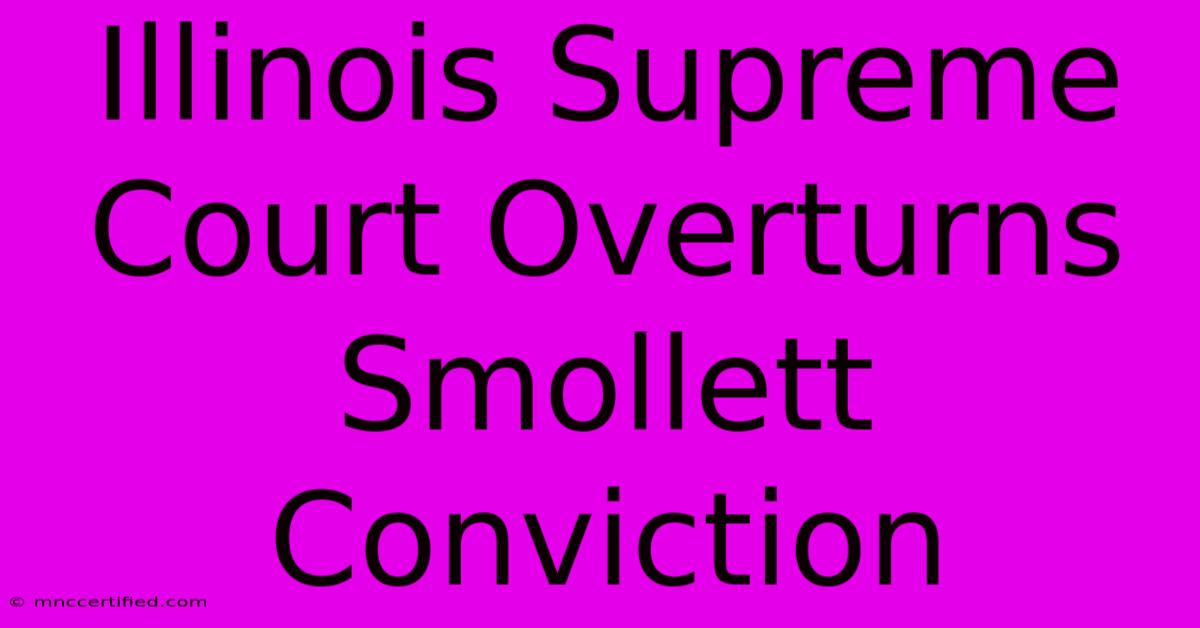Illinois Supreme Court Overturns Smollett Conviction

Table of Contents
Illinois Supreme Court Overturns Jussie Smollett Conviction: A Deep Dive into the Case and its Implications
The Illinois Supreme Court's decision to overturn Jussie Smollett's conviction has sent shockwaves through the legal and media worlds. This landmark ruling, delivered on [Insert Date of Ruling], throws into sharp relief the complexities of the case and raises crucial questions about prosecutorial overreach and due process. This article delves into the details of the case, examines the court's reasoning, and explores the broader implications of this controversial decision.
Understanding the Jussie Smollett Case: A Recap
Jussie Smollett, a former actor known for his role in the television series Empire, was initially convicted in 2021 on charges of disorderly conduct for allegedly staging a hate crime against himself in Chicago in 2019. Smollett claimed he was attacked by two masked men who shouted racial and homophobic slurs, but police investigations concluded the incident was a hoax orchestrated by Smollett himself. The prosecution argued that Smollett paid two brothers to stage the attack, aiming to garner sympathy and elevate his profile.
The initial trial resulted in a conviction, and Smollett faced a sentence of community service, fines, and a jail term. However, this conviction was far from the end of the legal battle.
The Illinois Supreme Court's Decision: Key Arguments
The Illinois Supreme Court's decision to overturn the conviction hinges on a critical procedural point: the dismissal of the original charges against Smollett. Special prosecutor Dan Webb, appointed to re-examine the initial handling of the case, dropped the charges in 2019. The court found that this decision prevented the later prosecution from being legally valid. Their central argument rested on the principle of double jeopardy, which protects individuals from being prosecuted twice for the same crime.
The court's ruling emphasized that by dropping the initial charges and subsequently allowing Smollett to forfeit his bond and complete community service, the state effectively ended the prosecution. The subsequent re-filing of charges, the court argued, violated Smollett's right to be free from double jeopardy.
Technicalities and Legal Precedent: A Deeper Look
The court's decision meticulously examined relevant legal precedents and statutes regarding dismissal of charges and subsequent prosecutions. This detailed analysis highlights the intricacies of Illinois' legal framework regarding double jeopardy and the significance of prosecutorial conduct in shaping the course of justice. The justices emphasized the importance of upholding procedural safeguards to ensure fairness and prevent abuses of power.
Implications and Reactions: A Divided Public Opinion
The Illinois Supreme Court's decision has ignited a firestorm of debate. Supporters argue that the ruling upholds crucial principles of due process and protects individuals from prosecutorial overreach. They highlight the potential for misuse of power when prosecutors can essentially reset a case after dismissing initial charges.
Conversely, critics argue that the decision lets Smollett off the hook for what they see as a blatant fabrication of a hate crime. They express concern that the ruling might embolden others to falsely claim victimhood. The decision also raises questions about the credibility of the justice system and its ability to effectively address hate crimes.
The Broader Context: Hate Crime Hoaxes and Public Trust
The Smollett case goes beyond a simple legal dispute; it has become a potent symbol of the complexities surrounding hate crime hoaxes and their impact on public trust. The ruling necessitates a broader conversation about how authorities investigate and prosecute such cases, ensuring both justice and protecting against false accusations.
Conclusion: An Ongoing Debate
The Illinois Supreme Court's decision to overturn Jussie Smollett's conviction marks a significant development in this already highly publicized case. It emphasizes the complexities of legal procedure and highlights the delicate balance between ensuring justice and protecting individual rights. The ruling will undoubtedly be subject to further legal scrutiny and will continue to shape discussions on due process, prosecutorial conduct, and the fight against hate crimes for years to come. The ongoing debate underscores the importance of understanding the nuances of legal precedent and their far-reaching consequences. This case serves as a vital reminder of the intricacies of the judicial system and the importance of upholding the principles of fairness and justice for all.

Thank you for visiting our website wich cover about Illinois Supreme Court Overturns Smollett Conviction. We hope the information provided has been useful to you. Feel free to contact us if you have any questions or need further assistance. See you next time and dont miss to bookmark.
Featured Posts
-
Rooneys Plymouth Move Coleens Jungle Trip
Nov 22, 2024
-
Seventh Iceland Volcanic Eruption
Nov 22, 2024
-
Kansas Insurance License Classes
Nov 22, 2024
-
Will Insurance Cover Dent In Car
Nov 22, 2024
-
Milhouse Voice Actress Retires From Simpsons
Nov 22, 2024